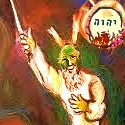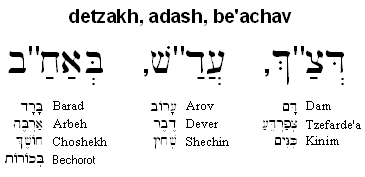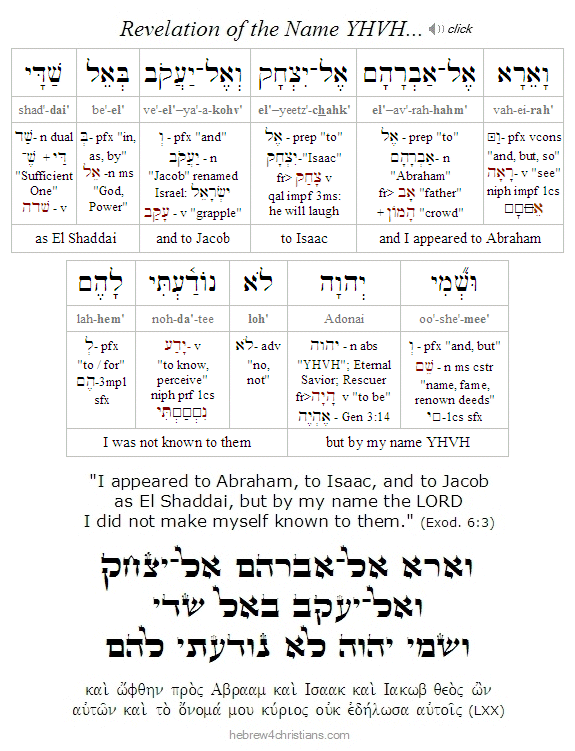|
Notice that the divine Name YHVH (יהוה) was of course already known in a cognitive sense by the pre-Mosaic fathers, but this passage (and the accompanying revelation of YHVH's four verbs of redemption ["I will free... deliver... redeem... take you"]) were intended to indicate that the direct experience of YHVH's power and glory was not fully apprehended by the patriarchs of Israel (for more information click here or see "The Revelation of YHVH").
God then told Moses that he was going to fulfill his promise to Abraham, Isaac, and Jacob by giving the Israelites the land of Canaan, and that he had heard the "groaning of the people of Israel whom the Egyptians held as slaves" (Exod. 6:5). He then instructed Moses to deliver a sevenfold promise to the people of Israel: 1) "I am the LORD, and I will bring you out from under the burdens of the Egyptians, and 2) I will deliver you from slavery to them, and 3) I will redeem you with an outstretched arm and with great acts of judgment. 4) I will take you to be my people and 5) I will be your God, and you shall know that I am the LORD your God, who has brought you out from under the burdens of the Egyptians. 6) I will bring you into the land that I swore to give to Abraham, to Isaac, and to Jacob; and 7) I will give it to you for a possession. I am the LORD" (Exod. 6:6-8).
The Four Cups of Passover
During the traditional Passover Seder, we drink four cups of wine (or grape juice) to remember these seven promises of God. These cups are as follows:
- The Cup of Sanctification (כּוֹס הַקִּידוּשּׁ) - "I will bring you out (i.e., hotzei'ti: הוֹצֵאתִי) of Egypt." The first cup "sets apart" the time of Passover (i.e., Kiddush).
- The Cup of Salvation (כּוֹס הַיְשׁוּעָה) - "I will deliver you (i.e. hitzal'ti: הִצַּלְתִּי) from slavery." The second cup celebrates the story of the Exodus (Maggid) and recounts the ten plagues (i.e., eser ha-makot: עֶשֶׂר הַמַּכּוֹת) described in the Book of Exodus.
- The Cup of Redemption (כּוֹס הַגְּאוּלָה) - "I will redeem you (i.e., ga'al'ti: גָאַלְתִּי) with My power." The third cup celebrates God's redemption through the blood of the lamb at the end of the meal (partaken after the Afikomen is eaten). This was the cup that Yeshua sanctified to commemorate the "blood of the new covenant" which He poured out for the remission of our sins (Luke 22:20; Matt. 26:28).
- The Cup of Restoration (כּוֹס הַשִּׁיקוּם) - "I will take you (i.e., lakach'ti: לָקַחְתִּי) as My people and I will be (וְהָיִיתִי) your God" This cup closes the Passover Seder (Hallel). Since Yeshua told his disciples that He would not drink the fourth cup but promised to do so with them in the coming Kingdom (Matt. 26:29), it may be called the Cup of Restoration, since it will be savored only after "all Israel shall be saved" (Rom. 11:26).

- The Cup of Elijah (כּוֹס אליהו) - The sages who compiled the text of the traditional Haggadah wanted to add a fifth cup based on the promise: "I will bring you (i.e., heveti: הֵבֵאתִי) into the land I swore to give to Abraham, Isaac, and Jacob" (Exod. 6:8), though at the time the Haggadah was composed, this promise had not been fulfilled. A "fifth cup" was therefore placed on the seder table as the "Cup of Elijah" and its promise expressed in the hope: "Next year in Jerusalem!" Today, we can say, "Next year in the Jerusalem rebuilt by the Messiah." Strictly speaking, the sages should have included a sixth cup to the seder, based on the promise that the LORD God would give (נָתַתִּי) the land to the Jewish people as an everlasting possession.
When Moses told the Israelites the good news of God's forthcoming redemption, the people would not listen because of their "shortness of breath" (מִקּצֶר רוּחַ) and their harsh slavery. The LORD then told Moses: "Go in, tell Pharaoh king of Egypt to let the people of Israel go out of his land." Moses then protested that if the Israelites would not listen to him, how could he hope to convince Pharaoh? The narrative does not provide an explicit answer to Moses' question, though it repeats that God "charged" Moses and Aaron to bring the people out of Egypt (Exod. 6:13).
The genealogy of Moses and Aaron is then given, which functions as a sort of "prelude" to the statement: "And the LORD said to Moses, 'See, I have made you like God to Pharaoh, and your brother Aaron shall be your prophet. You shall speak all that I command you, and your brother Aaron shall tell Pharaoh to let the people of Israel go out of his land" (Exod. 7:1-2). God then said that he would harden Pharaoh's heart so that he would not listen to them, which would then cause God to execute judgment upon Egypt for its oppression of the Jewish people. "Then I will lay my hand on Egypt and bring my hosts, my people the children of Israel, out of the land of Egypt by great acts of judgment" (Exod. 7:4).
When Pharaoh refused to let the people journey to the wilderness to worship the LORD, the "showdown" between the kingdom of man and the kingdom of God began. The Torah tells us that Moses was eighty years old, and Aaron eighty-three years old when they first encountered Pharaoh (Exod. 7:7). In their first exchange, Aaron's staff turned into a snake and swallowed the similar rods of the Egyptian sorcerers (Exod. 7:9-13). Nonetheless, Pharaoh "hardened his heart" and refused to let the Israelites go. God then began sending an increasingly severe series of plagues upon the Egyptians.

The first two plagues (turning the waters of the Nile to blood and the swarms of frogs) were duplicated by the Egyptian magicians, and Pharaoh was unimpressed. When the third plague (lice) afflicted the land, however, the magicians became fearful. After the fourth plague descended (swarms of insects), the Pharaoh appeared to relent, and even offered to let the Israelites worship the LORD without physically leaving the land of Egypt. After this plague abated, however, Pharaoh became obstinate again and changed his mind. Both the fifth plague (pestilence) and the sixth plague (painful boils) did not change Pharaoh's mind. For the seventh plague, thunder, fire and ice combined to form a devastating hail that killed livestock and vegetation throughout Egypt.
Despite seeing all these miracles, however, Pharaoh remained proud and unmoved. After Pharaoh still failed to relent, God further "hardened" his heart, setting the stage for the final plagues upon Egypt and the great Exodus of Israel from Egypt.
Addendum: The Plagues of Egypt

The plagues of Egypt (i.e., makot Mitzraim: מַכּוֹת מִצְרַיִם) refer to the calamities that befell Egypt by the hand of the God of Israel as recounted in the Book of Exodus. Since there were a total of ten distinct plagues delivered upon Egypt, they are also called the "Ten Plagues" (i.e., eser ha-makot: עֶשֶׂר הַמַּכּוֹת). These plagues are also mentioned in Psalm 78:44-51 and Psalm 105:23-39. In parashat Va'era, the first seven of the ten plagues are described.
- Makat Dam (מַכַּת־דָם): Water turned to blood (Exod. 7:14–25)
- Makat Tzefarde'a (מַכַּת־צְפַרְדֵּעַ): Frogs from the Nile (Exod. 7:25–8:11)
- Makat Kinim (מַכַּת־כּנִּים): Gnats (or lice) from the dust (Exod. 8:12–15)
- Makat Arov (מַכַּת־עָרוֹב): Swarms of flies (or wild animals) (Exod. 8:20–32)
- Makat Dever (מַכַּת־דֶבֶר): Pestilence (Exod. 9:1-7)
- Makat Shechin (מַכַּת־שְׁחין): Boils (Exod. 9:8-12)
- Makat Barad (מַכַּת־בָּרָד): Hail and Fire (Exod. 9:13-35)
- Makat Arbeh (מַכַּת־אַרְבֶּה): Locusts (Exod. 10:1-20)
- Makat Choshekh (מַכַּת־חוֹשֶׁךְ): Darkness (Exod. 10:21-29)
- Makat Bechorot (מַכַּת בְּכוֹרוֹת): Death of the firstborn (Exod. 11:1-12:36)
Exodus 12:12 God says, "... on all the gods of Egypt I will execute judgments." Thus the plagues are thought to be symbolic of the defeat of various gods venerated in ancient Egyptian mythology (and occultism in general):
- Water turned to blood - Hapi and/or Khnum (god of the Nile)
- Frogs from the Nile River - Heket (goddess of fertility and water)
- Gnats from the dust - Geb (god of the Earth)
- Swarms of Flies - Khepri (god of creation, lord of flies or beetles)
- Death of Livestock - Apis (goddess of animals depicted as a bull); Osiris
- Ashes to boils - Isis (goddess of nature, healing and peace)
- Hail and Fire - Nut (sky goddess and sister of Geb)
- Locusts sent from the winds - Set (god of storms, darkness, and disorder)
- Three days of darkness - Ra (the Sun god) and Set (god of darkness)
- Death of the firstborn - Pharoah ("son of Ra"); Khnum/ Amon (ram god)

Note: Some ask whether the "signs and wonders" of the plagues were intended more for the Israelites than for the Egyptians, since the Israelites had been oppressed by the powers of Egypt to the point of being "without the breath of hope."
Ten Plagues Acronym
During (the Maggid portion of) the Passover Seder, we spill from the second cup while reciting the names of the ten plagues. A tradition arose to recite three acronyms ("detzakh, adash, be'achav") while spilling from the cup three times:
 |
Midrash about Moses' Staff
Where did Moses get the mateh (מַטֶּה) - "staff' - he used to perform the various signs and wonders? According to Pirke Avot 5:6, the staff was one of the ten things that were created on the very first erev Shabbat at twilight. There were Hebrew letters engraved on the staff which formed an acronym for the ten plagues (i.e., detzakh, adash, be'achav).
The staff was given to Adam in the garden of Eden, and he passed it on to Enoch. Enoch gave it to Noach, who in turn gave it to Abraham. Abraham gave it to Isaac, and Isaac gave it to Jacob, who brought it with him to Egypt. After Jacob died, Joseph took the staff, and when he later died, it was put in Pharaoh's palace. Yitro, who was one of Pharaoh's advisers, later acquired it, and planted it in his garden in Midian. No one was able to remove it from there until Moses came and removed it. When Yitro saw this, he was convinced that Moses would be the one God would use to redeem Israel from Egypt, so he gave him his daughter Tzipporah as a wife. (Notice the similarity to the "King Arthur" legend of the sword of in the stone.)
Postscript: The Centrality of the Exodus
The Exodus is perhaps the most fundamental event of Jewish history. In addition to being commemorated every year during Passover (Exod. 12:24-27; Num. 9:2-3; Deut. 16:1), it is explicitly mentioned in the first of the Ten Commandments (Exod. 20:2), and it is recalled every Sabbath (Deut. 5:12-15). The festivals of Shavuot and Sukkot likewise derive from it (the former recalling the giving of the Torah at Sinai and the latter recalling God's care as the Exodus generation journeyed from Egypt to the Promised Land). Indeed, nearly every commandment of the Torah (including the laws of the Tabernacle and the sacrificial system) may be traced back to the story of the Exodus. Most importantly, the Exodus prefigures and exemplifies the work of redemption given through the sacrificial life of Yeshua the Messiah, the true King of the Jews and the Lamb of God.
As important as Moses was to the Exodus story, it is important to remember that only God may be called the Deliverer or Redeemer of Israel. God - not Moses - is rightly the focus of the story of the Exodus (indeed, the traditional text of the Passover haggadah does not even mention Moses' name). When Moses acted in his own strength, he was a "failed Messiah" of sorts. Moses needed to be humbled in the desert before he could learn to recognize the Divine Presence.... It was only after meeting Yeshua - the "Angel of the LORD speaking out of the midst of the fire" - that he was enabled to function as God's servant and mediator.
One additional thought. It is evident that the central purpose of God's redemption is to bestow freedom and dignity upon his people. As the story of Pharaoh reveals, God does not take kindly to oppressors, dictators, and other megalomaniacal world leaders who deny the truth and who therefore seek to enslave human beings created in His image and likeness. Just as God judged Egypt for its oppression and violence, so He will one day break the "rulers of this world" with a rod of iron and dash them in pieces like a potter's vessel (Psalm 2:9-10).
It's important to remember that the LORD redeems us so that we may become His children and therefore be clothed with everlasting dignity... Our redemption makes us heirs of the Kingdom of God and citizens of heaven. We must never regard ourselves as slaves - not to the State, not to banks, not to fear, and not to religious rituals or propaganda (Gal. 5:1). God gave up His Son for us so that we could be made free to live as his dearly loved children.... All the threats of the world system - economic, religious, social, etc. - are made empty and vain by the glorious redemption given to us in Yeshua our Savior.
The purpose of God's redemption is for us to be recreated in freedom and dignity as God's beloved children... We are saved for the sake of God's love and honor... To paraphrase C.S. Lewis: God doesn't love us because we are good, but God will make us good because He loves us... The freedom God gives is the power to choose goodness over evil.
|








